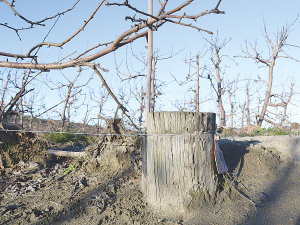Editorial: Getting RMA settings right
OPINION: The Government has been seeking industry feedback on its proposed amendments to a range of Resource Management Act (RMA) national direction instruments.
 Apple trees in the Esk Valley are still covered in two or more metres of silt, vineyards are all but wiped out and fences on farms remain in tatters.
Apple trees in the Esk Valley are still covered in two or more metres of silt, vineyards are all but wiped out and fences on farms remain in tatters.
OPINION: The time it’s taking the various bureaucracies to ease the pain of farmers, orchardists and townspeople affected by storm damage is grossly unfair.
Six months on, in some places such as Hawke’s Bay and Tairāwhiti, it seems like Cyclone Gabrielle occurred just a few days ago. What recovery?
Apple trees in the Esk Valley are still covered in two or more metres of silt, vineyards are all but wiped out and fences on farms remain in tatters.
In the case of the latter, the best some farmers have been able to do is repair their boundary fences.
Restoring normal subdivision of paddocks and tracks could take years, and the problem in many cases is compounded by the fact that the land is still moving.
However, the biggest worry is the fragility of the roading network on the North Island’s East Coast.
The road from Napier to Wairoa is anything but secure. Its fragility is even greater considering it’s not just ordinary cars that traverse it on a daily basis, rather heavily laden logging trucks, stock trucks, fuel tankers and vehicles bringing produce in and out of the region.
The road around the East Coast is the lifeline for farmers, orchardists, commercial growers, businesses and local people.
What irks many people in rural areas is the councils who, supported by government policies, have poured millions of dollars into cycleways.
Cycleways are arguably a ‘nice to do’ thing – akin to planting a rose garden in front of the council offices.
The people on the East Coast have no alternative but to use the only road and yet millions of dollars is being spent around the country catering for a minority who think they are saving the planet but forget the exorbitant cost of their indulgent habit.
For East Coasters and others in remote rural NZ, secure infrastructure means life and death to them, their communities and to the economy of NZ.
The wasted money spent on cycleways could probably fix the problem on the East Coast, but there are probably no votes in this.
An independent report, prepared for Alliance farmer shareholders is backing the proposed $250 million joint venture investment by Irish company Dawn Meats Group.
Whangarei field service technician, Bryce Dickson has cemented his place in John Deere’s history, becoming the first ever person to win an award for the third time at the annual Australian and New Zealand Technician of the Year Awards, announced at a gala dinner in Brisbane last night.
NZPork has appointed Auckland-based Paul Bucknell as its new chair.
The Government claims to have delivered on its election promise to protect productive farmland from emissions trading scheme (ETS) but red meat farmers aren’t happy.
Foot and Mouth Disease outbreaks could have a detrimental impact on any country's rural sector, as seen in the United Kingdom's 2000 outbreak that saw the compulsory slaughter of over six million animals.
The Ministry for the Environment is joining as a national award sponsor in the Ballance Farm Environment Awards (BFEA from next year).

OPINION: For years, the ironically named Dr Mike Joy has used his position at Victoria University to wage an activist-style…
OPINION: A mate of yours truly has had an absolute gutsful of the activist group SAFE.